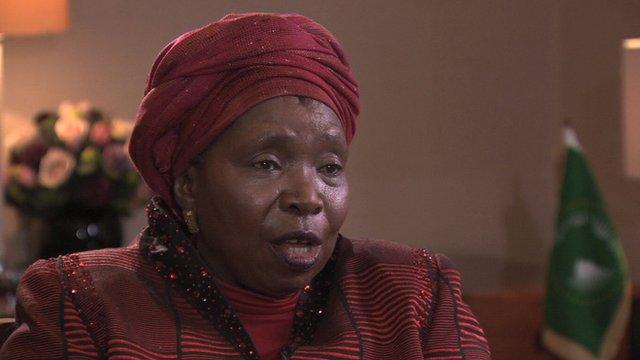Nkosazana Dlamini-Zuma - South Africa's first female leader?
- Published
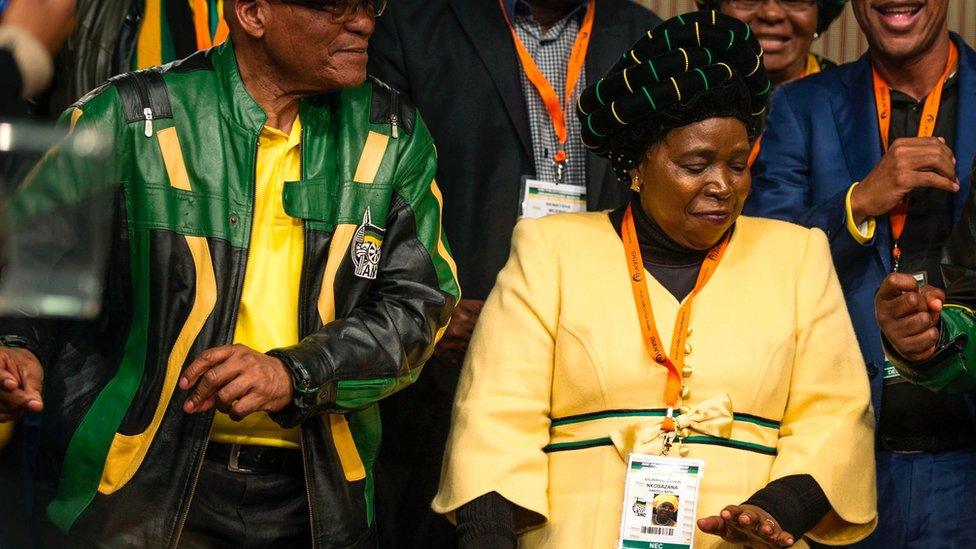
Jacob Zuma wants his ex-wife to succeed him as party leader
South Africa's President Jacob Zuma is keen to hand over the reins of power to the mother of his children.
Nkosazana Clarice Dlamini-Zuma, 68 - a senior member of the governing African National Congress (ANC) - has been criss-crossing the country in recent months seeking a mandate to be its first woman president.
Since returning from a five-year stint in Addis Ababa running the African Union, Ms Dlamini-Zuma has addressed crowds at events from funerals to political rallies.
The eldest of eight children, she was born in the rolling hills of KwaZulu-Natal province in 1949 and joined the underground anti-apartheid student movement in the early 1970s while at medical school there.
This raised the ire of the apartheid regime. She was forced to flee into exile and eventually completed her studies at Bristol University in the UK in 1978.
'In the claws of the ex-husband'
The newly qualified Ms Dlamini-Zuma worked at Mbabane Government Hospital in Swaziland. This is where she met and was charmed by Mr Zuma, then also an exiled member of the ANC.
Mr Zuma is a polygamist, and she was one of his three wives until she divorced him in 1998. Ms Dlamini-Zuma, who had four children with her ex-husband, never remarried.
Nevertheless, President Zuma, who steps down as party leader in December, has endorsed her to succeed him as ANC president, and preferably of the country after elections due in 2019.
Pressure has been increasing on him to step down earlier amid accusations of corruption, which he denies.
Asked whether she should rise to the very top of the political landscape, he said: "She has grown in the struggle. She has run a number of positions. She has been a minister in a number of departments, there's no question at all.
"If the ANC says we think we can give this responsibility and she agrees, then that's not a concern at all."

Who is Nkosazana Dlamini-Zuma?

A leading anti-apartheid activist
Fled South Africa and completed medical training in UK
Met ex-husband Jacob Zuma while working as a doctor in Swaziland
Divorced him in 1998 after 16 years of marriage
Declined offer to take place of her sacked ex-husband as deputy president in 2005
Chair of the African Union commission from 2012 to 2016

She reported the local Sunday Times newspaper to the independent press council after it quoted unnamed sources in January as saying that she was spending "a lot of time" at the president's rural homestead.
The council ordered the newspaper to apologise for presenting the allegation "as fact in its headline".
Her lawyers had dismissed the report as "untruthful, inaccurate and unfair", and accused the newspaper of publishing a "bizarre story that an African woman, despite divorcing her husband to whom she had been married in terms of the Civil Law, remains in the claws of the ex-husband in the name of polygamy".
A former leader of the women's wing of the ANC, she had the confidence of South Africa's first black president, Nelson Mandela, who appointed her as health minister after the end of white minority rule in 1994.
She was widely credited with introducing legislation which made it illegal for people to smoke in public areas such as restaurants and airports.
Her tenure as health minister was followed by a 10-year stint as foreign minister, during the rule of Mr Mandela's successor - and Mr Zuma's rival - Thabo Mbeki.
Mr Mbeki had offered her the post of deputy president after he sacked Mr Zuma in 2005, following allegations of corruption against him.
'Walking with the wolves'
The rise of NDZ - as she is sometimes referred to nowadays - has not come without controversy.
While health minister she became embroiled in the first big corruption scandal to hit the ANC government.
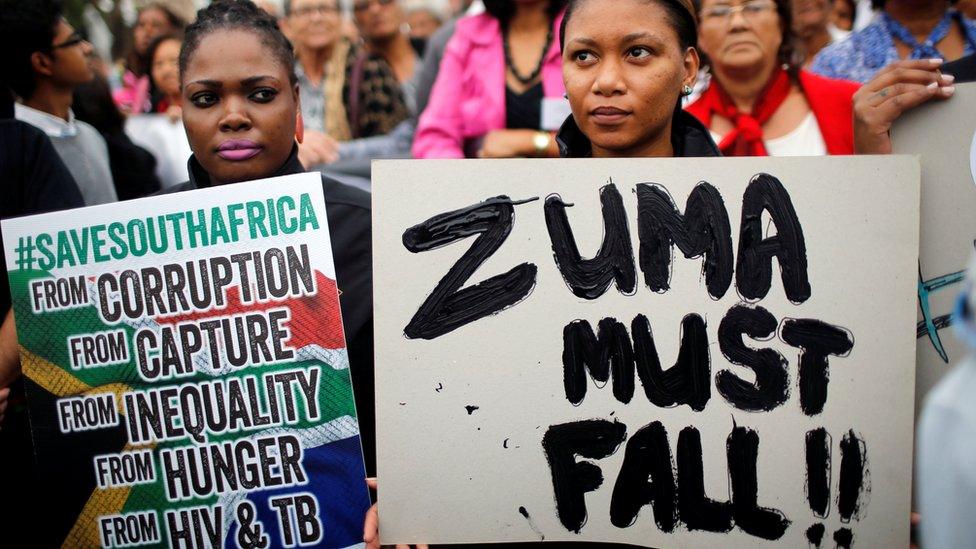
Increasing numbers of South Africans want Jacob Zuma to resign
Her department awarded a 14 million rand ($1,2m; £700,00) tender to renowned playwright Mbongeni Ngema to come up with a sequel to Sarafina, a musical to educate people about the dangers of HIV/Aids.
Following a public outcry over the huge cost of the musical, an anti-corruption body - the public protector's office - carried out an investigation.
It led to the termination of the contract.
"Mr Ngema's company had not adhered fully to the spirit and terms of the contract, and it appeared they had tendered a defective service," the public protector's office said.
Ms Dlamini-Zuma refused to resign, despite pressure from the opposition.
Also as health minister, she was criticised for supporting Virodene, a toxic substance which had been rejected by the wider scientific community, as a remedy for HIV/Aids.
After spending most of her life fighting for the downtrodden, she has uncharacteristically chosen to walk with the wolves during the current campaign. Some of her current backers have a litany of corruption scandals hanging around their necks.
Many of her old comrades are irked by her political expediency, even if it is for the top job in Africa's most industrialised economy.
'My own woman'
More recently, she was chastised for labelling nationwide protests calling for President Zuma to step down as "rubbish" in a tweet which was then deleted from her timeline.
Girls should be at school, says AU Chair Nkosazana Dlamini-Zuma
Some said Mr Zuma was trying to protect himself from prosecution over corruption allegations, because if his former wife becomes president, she would be reluctant to send the police to lock him up during his retirement in his village of Nkandla.
However NDZ was incensed at the suggestion she wants to be president in order to protect her former husband from his legal woes.
She said: "I am my own woman and I have worked hard to be here," she told the Johannesburg Star newspaper.
"I have my own track record in the ANC and in government. I am a doctor and one of the longest-serving cabinet ministers under former Presidents Nelson Mandela and Thabo Mbeki. Before Zuma became president," she was quoted as saying.
Those who know her well describe Ms Dlamini-Zuma as firm, controlling and someone who at times tells it like it is. But at home some of her stories are of a motherly figure.
Even though there are other women aspiring to the number one spot, she has become the face of the ANC Women's League's call that "South Africa is ready for a woman president."
The diminutive figure I have come to know over the years is a humble and intellectually astute individual. But unlike her former husband, her personality cannot be described as charming.
But the question is whether the people will follow her as she continues to soldier on towards the presidential seat.
- Published17 June 2024
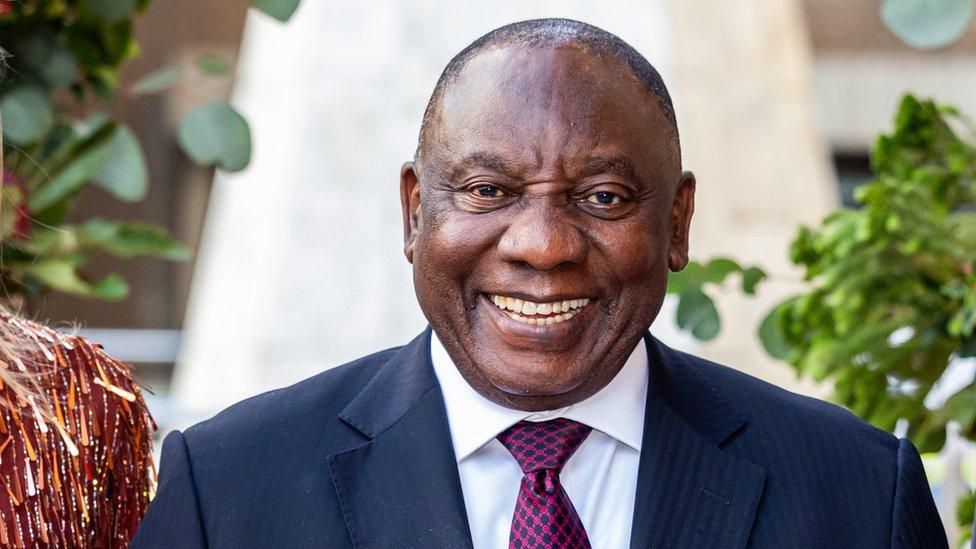
- Published6 April 2018
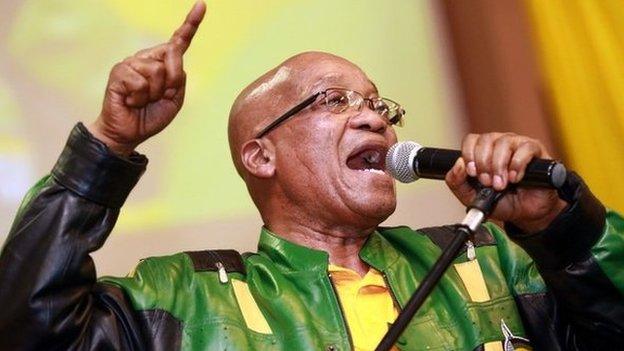
- Published26 November 2015
